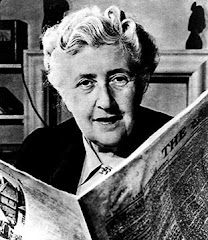| Who is U.N. Owen and will he be waiting for his guests when they arrive to the island or will he make the boat trip with them? Who would create such a creepy poem and then have the nerve to pass it on as a nursery rhyme?! Do Indians truly inhabit that island? Why are there only two service people for a group of 10 people who seem to be very helpless without assistance? Why hasn't Fred come back with the boat yet? Where is U.N. Owen? Why did he bring a revolver with him on a weekend vacation? Did any of these people truly commit the crimes accused by the gramaphone? Who poisoned his drink? Or was it something he had previously before arriving at the island that killed him? Is the murderer one of the ten guests or another group of people hiding on the island? If they all went up the servants quarters, who could've stuck Emily with the syringe? With the exchanging of stories of what really happened, will they create teams within the group as it diminishes and create a buddy system? Why wasn't Vera killed when she felt the wet clammy wrap around her neck? Who repositioned the chair in it's proper place after Vera killed herself. Everybody's dead! Who is it? Why did she kill herself? |
Friday, April 18, 2008
Questions-Nicki
Definitions-Nicki
| ve·he·ment –adjective 1. zealous; ardent; impassioned: a vehement defense; vehement enthusiasm. dec·o·rous adj. Characterized by or exhibiting decorum; proper: decorous behavior. rancour noun a feeling of deep and bitter anger and ill-wi wield –verb (used with object) 1. to exercise (power, authority, influence, etc.), as in ruling or dominating. ether –noun 1. Also called diethyl ether, diethyl oxide, ethyl ether, ethyl oxide, sulfuric ether. Chemistry, Pharmacology. a colorless, highly volatile, flammable liquid, C4H10O, having an aromatic odor and sweet, burning taste, derived from ethyl alcohol by the action of sulfuric acid: used as a solvent and, formerly, as an inhalant anesthetic. châ·teau –noun 1. (in France) a castle or fortress. 2. a stately residence imitating a distinctively French castle. 3. a country estate, esp. a fine one, in France or elsewhere on the Continent. 4. (often initial capital letter) a winegrower's estate, esp. in the Bordeaux region of France: often used as part of the name of a wine. cas·car·a –noun a buckthorn, Rhamnus purshiana, of the Pacific coast of the U.S., having finely toothed leaves and flowers in umbels and yielding cascara sagrada. Also called cascara buckthorn, bearberry, chittamwood. des·ul·to·ry –adjective 1. lacking in consistency, constancy, or visible order, disconnected; fitful: desultory conversation. o·blique adj. Having a slanting or sloping direction, course, or position; inclined. genially adverb in an affable manner clam·ber intr.v. clam·bered, clam·ber·ing, clam·bers To climb with difficulty, especially on all fours; scramble. n. A difficult, awkward climb. pri·mus –noun, plural -mus·es. (often initial capital letter) Scottish Episcopal Church. a bishop who is elected to represent the church body and to summon and preside at synods but who possesses no metropolitan power. cis·tern n. A receptacle for holding water or other liquid, especially a tank for catching and storing rainwater. Anatomy A cisterna. sa·gac·i·ty Pronunciation Key - Show IPA Pronunciation –noun acuteness of mental discernment and soundness of judgment. cumbrous adjective difficult to handle or use especially because of size or weight; "a cumbersome piece of machinery"; "cumbrous protective clothing" [syn: cumbersome] pit·i·a·ble –adjective 1. evoking or deserving pity; lamentable: pitiable, homeless children. 2. evoking or deserving contemptuous pity; miserable; contemptible: a pitiable lack of character. si·phon –noun 1. a tube or conduit bent into legs of unequal length, for use in drawing a liquid from one container into another on a lower level by placing the shorter leg into the container above and the longer leg into the one below, the liquid being forced up the shorter leg and into the longer one by the pressure of the atmosphere. Bed·ou·in or Bed·u·in n a nomadic Arab of the desert regions of Arabia and North Africa in·quest n 1. an official inquiry in front of a jury into the facts of a case such as a sudden unexpected death 2. an investigation of the facts of a situation, particularly one that had an undesired outcome (literary) Se·mit·ic n a group of languages belonging to the Afro-Asiatic family and spoken in North Africa and southwestern Asia, including Hebrew, Arabic, Aramaic, Maltese, and Amharic adj 1. in or relating to Semitic 2. relating to the peoples who speak Semitic languages si·ne qua non n an essential condition or prerequisite ru·mi·nate v 1. vi to regurgitate partially digested food and chew it again (refers to ruminants) 2. vti to think carefully and at length about something re·cum·bent adj 1. lying back or lying down (literary) 2. used to describe a plant or animal part that rests or leans against something else 3. used to describe a fold whose axis is more or less horizontal squall1 n 1. a sudden strong wind, often with heavy rain or snow 2. a short but noisy disturbance 3. a brief but intense outburst of temper vi to blow strongly and suddenly (refers to the wind) im·per·cep·ti·ble adj very slight or gradual dis·par·ag·ing adj showing or expressing contempt or disapproval pur·port vti 1. to claim, seem, or profess to be something specified 2. to intend to do something (formal) n (formal) 1. the meaning or significance of something 2. intention or purpose of something bluff a high steep bank, cliff, or headland, especially one with a broad face adj 1. having a broad, flattened, or rounded steep front 2. cheerful and friendly but outspoken and often insensitive to others’ feelings jet·ty 1. a wall or other barrier built out into a body of water to shelter a harbor, protect a shoreline from erosion, or redirect water currents 2. a landing pier caus·tic adj 1. corrosive or burning by chemical action 2. very sarcastic, in a way that is particularly bitter or cutting or causes intensely bad emotions n 1. a substance that can corrode or burn away other substances by chemical action, especially a strong alkali 2. a peaked curve formed on a plane by parallel light rays reflected or refracted from a cylindrical or spherical surface pur·port·ed adj supposed or claimed to be, but without any evidence or proof of it (formal) ver·i·si·mil·i·tude n (formal) 1. the appearance of being true or real 2. something that only appears to be true or real, for example, a statement that is not supported by evidence |
Subscribe to:
Posts (Atom)

